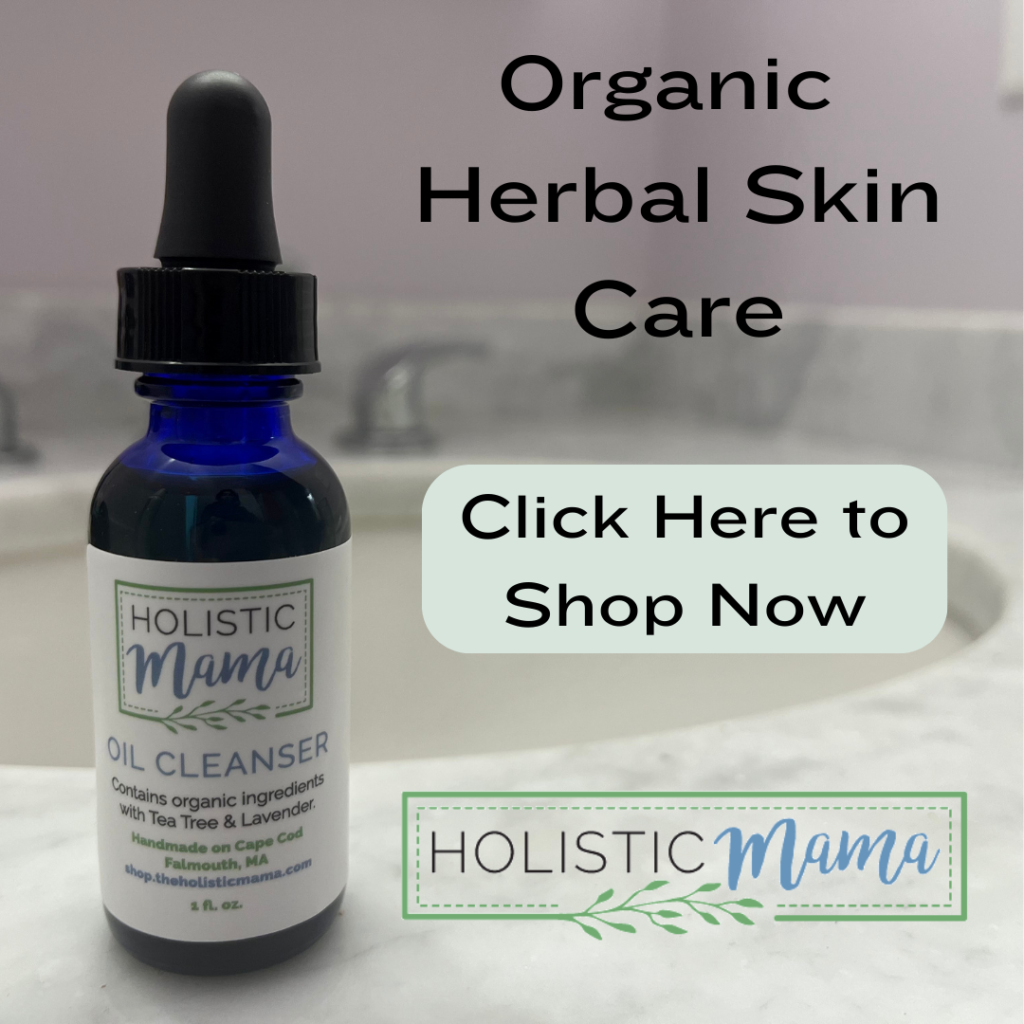-
Homemade Mouthwash Recipe
Category: Natural Skin Care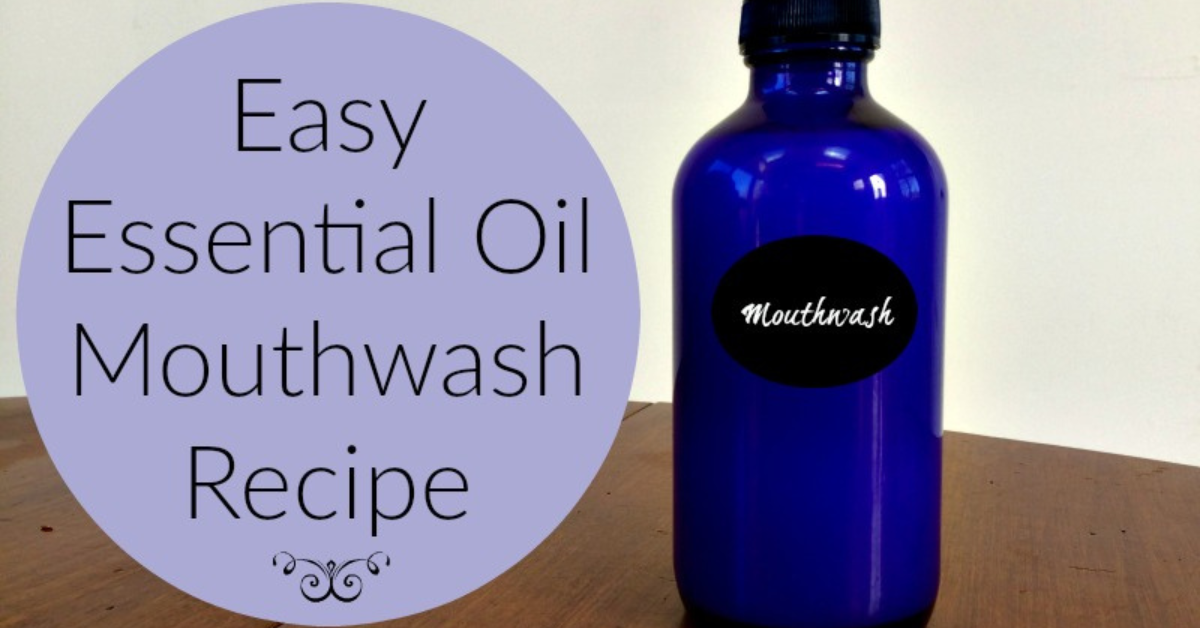
Want an easy homemade mouthwash recipe? This recipe is healthy and tastes good enough for children to use. Why would you want to make your own mouthwash? Well, when I took my first child to a (conventional) dentist I asked her if she thought mouthwash was a good idea for kids. She said no, which was surprising. After being very unsatisfied, I traveled far to see a holistic dentist who was an advocate for natural mouthwashes for children. Mouthwash sounded like a really easy way to upgrade our nightly brushing routine.
The first problem with most kids mouthwashes is they contain fluoride, which is a known toxin. After ruling out those products, there are still unfavorable ingredients like artificial colors and flavors or high alcohol content. After all that label reading, it's just easier to make a homemade mouthwash recipe.
Healthy Mouthwash Ingredients
- Xylitol – Research has shown that this sweetener helps to repair tooth enamal. It also balances the PH in the mouth to prevent decay.
- Aloe Vera- Aloe helps to fight plaque and gum disease.
- Calcium Carbonate – Calcium helps to keep teeth strong and harden soft or weakened enamal
- Trace Minerals – to help remineralize tooth enamel
- Witch hazel – Witch hazel is astringent which means it helps to keep gums tight and healthy
- Essential Oils – Essential oils are anti-microbial and anti-inflammatory which helps to keep teeth and gums healthy while getting rid of germs. Some good oils to use:
- Lemon
- Orange
- Clove
- Peppermint
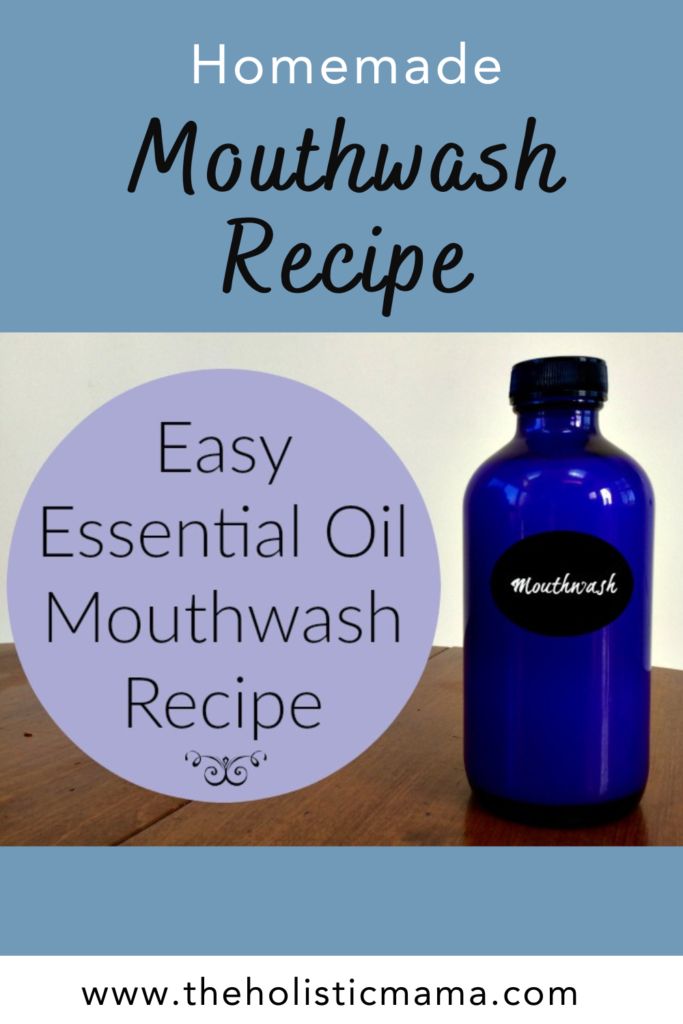
Natural Mouthwash Recipe
- 2 cups distilled water
- 1 tbsp. witch hazel
- 1 tbsp. aloe vera juice
- 2 tsp. xylitol powder
- 1 tsp. calcium carbonate powder
- 8 drops trace minerals
- 10 drops essential oil
Add all of the ingredients into a mason jar, cap the jar and shake until everything is combined. Pour the mixture into a smaller bottle to use in the bathroom. The xylitol makes it sweet tasting and when you use essential oils like lemon and orange it's very kid-friendly.
Thank you for reading this post, don't forget to subscribe to stay in the loop. If you are looking for some of the healthy tools and resources mentioned in my articles, take a look at my healthy shopping guide.
Some of our links are affiliate links, which means if you click and buy, I earn a small commission. The price is the same for you, though. Thank you!
You might also like these posts…
-
Is a Kids Non-Toxic Mattress Worth it?
Category: Self Care
Should you buy a kids non-toxic mattress? Most naturally minded parents have at least considered purchasing a non-toxic mattress for their child. It is a topic that has become pretty well known in the last few years. The reality is, it's a big purchase and no one wants to waste money on gimmicks or kids product trends so you may ask yourself – is a kids non-toxic mattress really necessary?
The Main Problem with Conventional Mattresses
As of July 1, 2007, all U.S. mattresses are required to be flame retardant. The result is that manufacturers are coating mattresses with highly toxic flame-retardant chemicals. Chemicals like polybrominated diphenyl ether (PBDE), Boric acid, and antimony (a known carcinogen) are all over your mattress. What is even worse is that this does NOT have to be disclosed in any way. The Consumer Product Safety Commission has studied chemically treated mattresses and found that the chemicals do, in fact, leech from the mattress. This means that when your child sleeps on a conventional mattress she will be absorbing these chemicals all night long.
Why It's A Problem for Children
People like to talk about how they never had an “organic” mattress growing up so it's really not necessary for their own children. The reality is that mattresses before 2007 were not a problem because the flame retardant mandate was not in effect. This is a new problem that effects our children and was not something our parents had to think about. Most children sleep 12 hours per day at a minimum. The shear amount of time they spend in bed is a huge concern. Some of the chemicals used on mattresses, like PBDE's, get into our system and never leave the body except when shed in breast milk. These toxins will be building up in your child's body and stored in fat cells for years upon years if they sleep on a conventional mattress. Every new parent has heard about SIDS, right? Well, Dr. James Sprott, OBE, a New Zealand scientist and chemist, states that crib death is caused by toxic gases, which can be generated from a baby’s mattress. There has always been little to no explanation for the causes of SIDS and this theory is pretty solid.
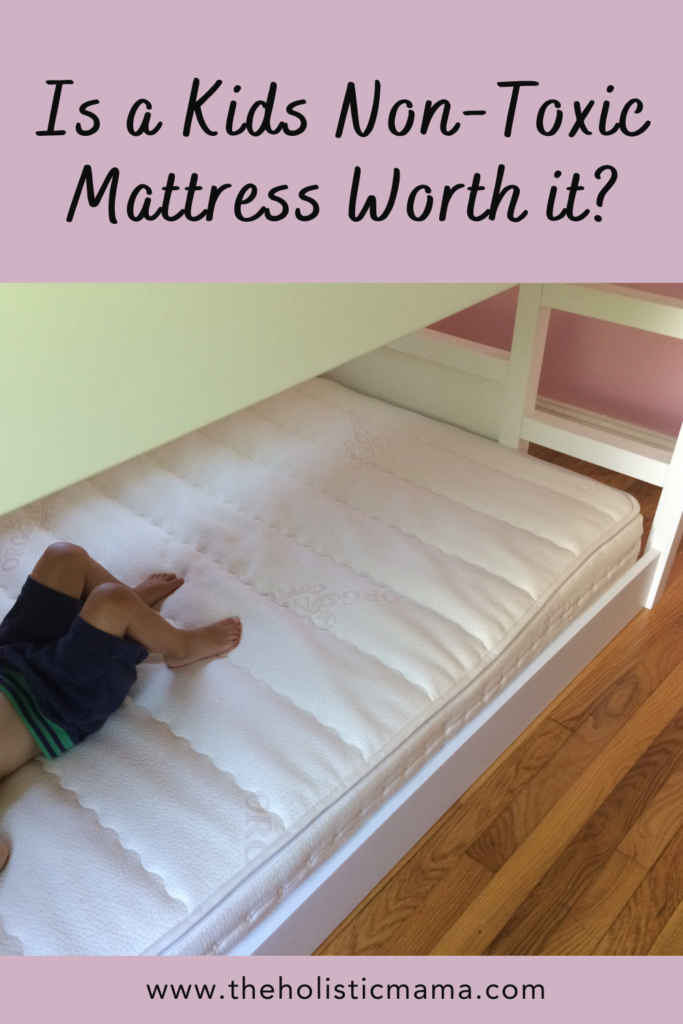
The Best Non-Toxic Mattress
When it comes to non-toxic and organic mattresses, there are a lot of choices. You'll see spring mattresses made with organic materials, latex, gel, and foam mattresses. The safe mattress alternatives also range in price point starting at around $1,000 all the way up to $8,000+ depending on size and thickness. When I first began my research on purchasing a kids non-toxic mattresses, these are the factors I considered:
- Price
- Back Support
- Materials used
- How long it will last
- Hypoallergenic
After searching all the different types of mattresses the one that made the most sense to me and fit all my criteria was natural latex. The first few companies I researched were very expensive. The cost of a twin mattress was at least $3,000 or more. This was extremely prohibitive and I thought I'd never be able to make the switch. I was lucky enough to find a company called Plush Beds that makes a natural latex mattress that lives up to my standards for quality and price. The twin mattresses I bought for my children were just around $1,000 each including shipping and some extras like pillows and sheets. Click here to learn more about the Botanical Bliss mattress from Plush Beds. I also did a review on their latex pillow, click here if you want to check that out.
Thank you for reading this post, don't forget to subscribe to stay in the loop. If you are looking for some of the healthy tools and resources mentioned in my articles, take a look at my healthy shopping guide.
Some of our links are affiliate links, which means if you click and buy, I earn a small commission. The price is the same for you, though. Thank you!
You might also like these posts…
-
7 Signs You are Chronically Dehydrated
Category: Self Care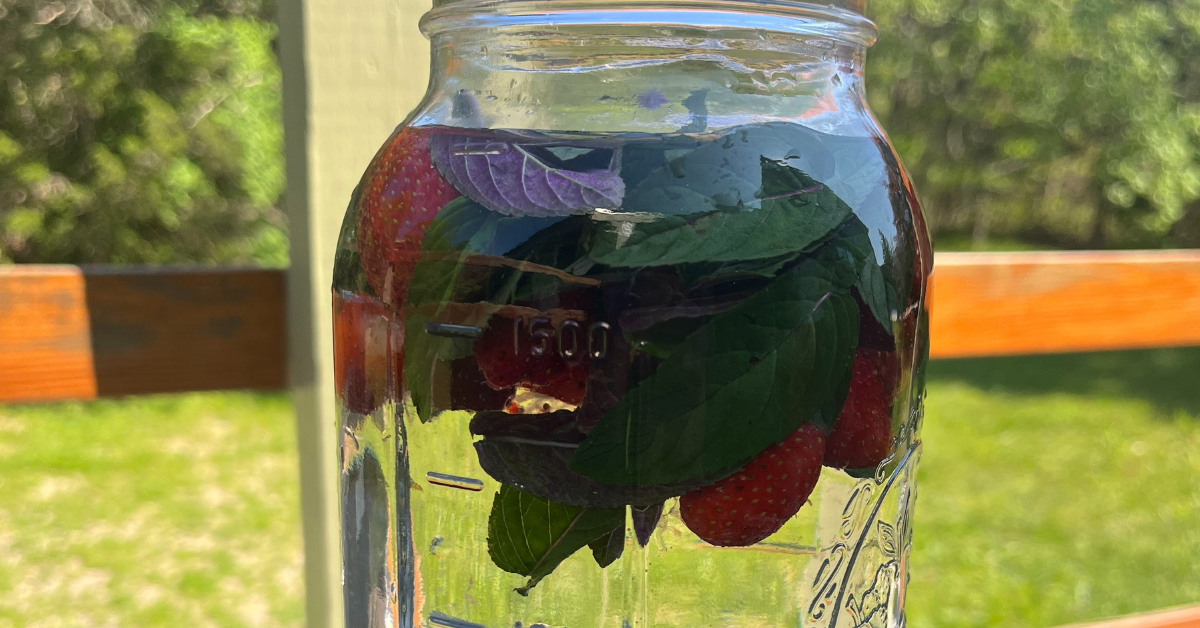
Most Americans are chronically dehydrated. In today's modern busy lifestyle it's very easy to forget simple, yet vital, habits like drinking enough water. If you drink coffee, the problem is even bigger. Caffeinated and sweetened beverages won't help your cause, they just keep you in a constant state of dehydration. Dehydration is not just an adult problem either. The Harvard School of Public Health says that more than half of U.S. children are dehydrated. Although excessive dehydration in children and adults can cause serious health issues, even minor dehydration can cause symptoms. Many of us live with minor (and sometimes not so minor) annoying symptoms and don't realize why it's happening. Of course it's important to drink extra water during warmer months but your body can become dehydrated any time of year. If you or your children experience any of these seven symptoms you're probably chronically dehydrated.
7 Signs You're Chronically Dehydrated
- Fatigue – this can be a symptom of a number of different conditions but if you are dealing with fatigue, first try drinking more water to see if the problem subsides.
- Headaches – not drinking enough water often leads to headaches. At the first sign of a headache, increase your water intake and the pain may go away.
- Dry skin – dehydration is always a factor when dry skin is present. Along with proper amounts of water, also look at your fat intake. Soothe dry skin from the outside with clean organic moisturizers that don't have any irritating ingredients.
- Dry, irritated eyes – dry and irritated eyes can also be a sign that you need to drink more water.
- Joint pain & Muscle Aches – aches and pains can have multiple causes but dehydration is surely one reason why you may be feeling that way.
- Hunger – you may not always think about drinking water when you're hungry (or hangry) but you may just need some extra water. If you feel hungry between meals, try drinking water and see if the feeling subsides.
- Thirst – this is an obvious one but many of us are so busy we ignore even the simplest signs of chronic dehydration.
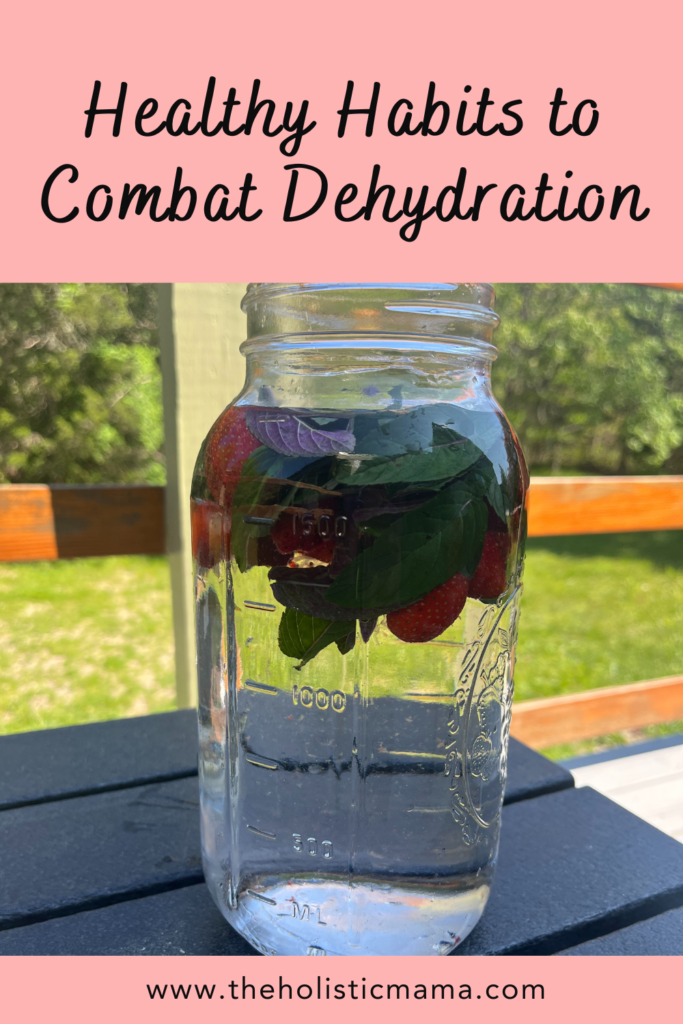
Healthy Habits to Combat Dehydration
- Carry a water bottle. Keeping a water bottle with you at all times is a great way to remember to always drink water. If you sit at a desk, keep a glass of water next to you as you work. Make sure you use a water bottle made of safe stainless steel (like this), or glass (or this) to avoid BPA and other contaminants.
- Give your water a boost. Many people say they don't drink a lot of water because it's boring. Give your water a boost by adding some fresh fruit to flavor your water or a sugar free electrolyte powder like LMNT or try sole water. This will give you something more interesting to drink without taking away from the hydration factor.
- Track your intake. To reach any goal in life, tracking is essential. If you are serious about increasing your water intake and stop being chronically dehydrated, make this a habit. Start a log on the notepad on your phone or keep a small notepad in your bag and keep track of the amount of water you are drinking each day.
- Eat (and drink) plenty of fruit. Not only does fruit contain healthy vitamins and minerals it also contains a lot of water. It has been said that eating the water contained in plants is actually more hydrating then drinking water alone. Juicing fruit is a way to get ultra hydration fast.
- Drink herbal teas that promote hydration. There are some herbs that can help the body hydrate such as chamomile and hibiscus, this is a delicious tea mix. Drink these teas cold or hot and keep them unsweetened for lightly sweetened with honey. Read this post for more hydrating tea ideas.
One last thing to consider – please make sure your water is filtered. The best water filtration system (and one of the few I've seen that has no plastic parts if you get the stainless steel spout) is the Berkey Water Filter.
Thank you for reading this post, don't forget to subscribe to stay in the loop. If you are looking for some of the healthy tools and resources mentioned in my articles, take a look at my healthy shopping guide.
Some of our links are affiliate links, which means if you click and buy, I earn a small commission. The price is the same for you, though. Thank you!
You might also like these posts…
Holistic Mama Blog

